Prairie Mimosa, Illinois Bundleflower, Prickleweed, Illinois Desmanthus - Desmanthus illinoensis
|
Desmanthus illinoensis - Prairie Mimosa, Illinois Bundleflower, Prickleweed, Illinois Desmanthus. While there are 14 species of Bundleflower (Desmanthus) in the United States, Desmanthus illinoensis - Prairie Mimosa - has by far the widest distribution. Most species are limited to one or two states each, with a handful in a few more states than that, but Desmanthus illinoensis is found in 29 states in the south and central parts of the United States. Texas has the prize with the most Desmanthus species, with 10 species found in the state.
Syn. Acuan illinoense; Mimosa illinoensis
Found in:
AL, AR, CO, DC, FL, GA, IA, IL, IN, KS, KY, LA, MD, MN, MO, MS, NC, ND, NE, NM, NV, OH, OK, PA, SC, SD, TN, TX, UT, VA, WI
Leave comments on Desmanthus illinoensis at this link. | 
Distribution of Desmanthus illinoensis in the United States and Canada:

Blue=Native; Grey=Introduced
Map from USDA Plants Database:
USDA, NRCS. 2017. The PLANTS Database (http://plants.usda.gov, 08 May 2025). National Plant Data Team, Greensboro, NC 27401-4901 USA.
Search Our Database: Enter any portion of the Scientific, Common Name, or both.
Do a general Google search of the entire site:
#ad
 Follow USWildflowers on Twitter
#ad
| | Site: Dade County, GA Date: 2013-August-04 | Photographer: Gerald C. Williamson
Nikon D7000
Tamron SP 90MM f/2.8 AF Macro | | The flowerheads are on separate axillary peduncles which are up to 3 inches long. The flower contains 25 to 50 florets, each of which has 5 short pale green (perhaps lined with white) petals and 5 strongly exserted stamens. The long filaments are white which gives the blossom a white appearance rather than green. | | 
| | Site: Dade County, GA Date: 2013-August-04 | Photographer: Gerald C Williamson
Nikon D7000 | | The flowerhead before the florets open. | | Click on the photo for a larger image
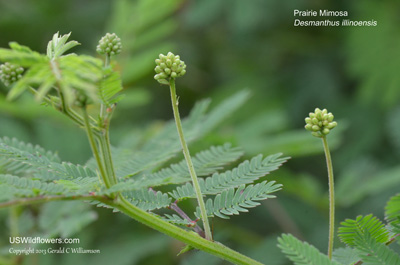
| | Site: Dade County, GA Date: 2013-August-04 | Photographer: Gerald C Williamson
Nikon D7000 | | Shortly after the the flowers die the elongated seedpods start to form. | | Click on the photo for a larger image
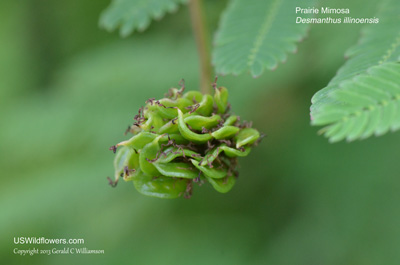
| | Site: Dade County, GA Date: 2013-August-04 | Photographer: Gerald C Williamson
Nikon D7000 | | Each seedpod contains 2 to 5 seeds. The twisted pods will turn dark brown; the seeds are more a burnt sienna. | | Click on the photo for a larger image
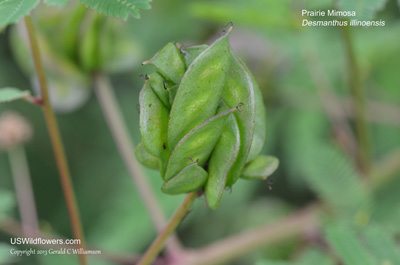
| | Site: Dade County, GA Date: 2013-August-04 | Photographer: Gerald C Williamson
Nikon D7000 | | The leaves of Prairie Mimosa are bipinnately compound. The compound leaf can be up to 8 inches long. Each of the compound secondary leaves have 20 to 30 opposing leaflets each of which are one-quarter to one-half inch long, and there may be up to 15 secondary compound leaves per leaf. The leaves fold somewhat when touched and may also do so in strong sunlight. | | Click on the photo for a larger image
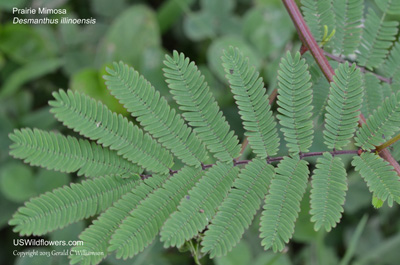
| | Site: Dade County, GA Date: 2013-August-04 | Photographer: Gerald C Williamson
Nikon D7000 | Prairie Mimosa can grow up to 5 feet tall and grow in large colonies, forming dense thickets in sunny areas.
This species is considered to be weedy by some, but its seeds are consumed by game birds, and the foliage is a good source of protein for herbivores. It grows in prairies, along the edges of marshy areas, and in disturbed areas. | | Click on the photo for a larger image
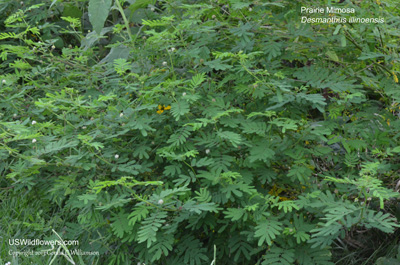
|
References used for identification and information:
|
|
| |
| #ad
|
|








